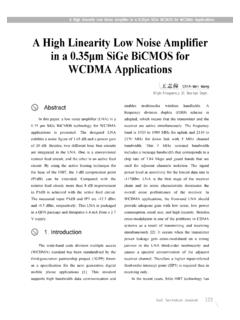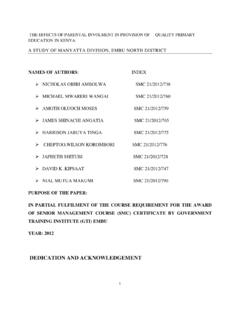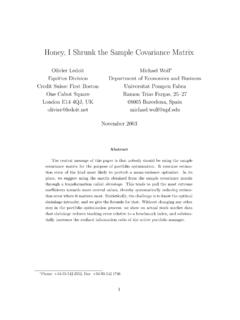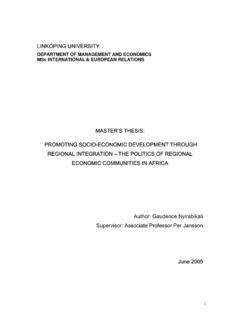Transcription of Project Manager Leadership Role in Improving Project ...
1 13 March 2010 Vol. 22 No. 1 Engineering Management JournalProject Manager Leadership Role in Improving Project PerformanceVittal S. Anantatmula, Western Carolina Universityrole in Project success is not addressed in Project management literature. The purpose of this article is to address this gray area. In this article our focus is to identify a set of people-related Project performance factors, and to understand how these factors interact with one another. Using these inter-relationships, we develop a model to analyze the Project Manager s role in Improving Project performance. We start with a review of literature to document the importance of Project Leadership as a background for the research, and then identify a list of people-related Project success factors.
2 We then present the research methodology for collecting data to develop underlying relations among these factors. As a part of our analysis, we explore the structural linkages between these factors and provide a detailed discussion about these linkages. Further, we discuss how to use these linkages to establish management and Leadership roles in Improving Project performance from research and practitioner s perspectives. Finally, we present limitations of the research study and suggest opportunities in the future research efforts. Literature ReviewProjects are used as a means to achieve an organization s strategic goals. It is obvious that global spending on projects is in the order of many billions of dollars annually; however, in spite of advances in the Project management (PM) discipline, the common experience suggests that many projects fail (Williams, 2005).
3 Consequently, many current research efforts are focused on Improving Project term Project success is considered different from Project management success. Project success is measured against the overall objectives of the Project whereas Project management success is measured against the traditional gauges of performance such as completing Project within time, cost, and meeting scope and quality (Cooke-Davies, 2002); however, whenever the term success is referred to in this study, it encompasses both the above definitions and is in line with Jugdev and M ller s (2005) notation of Project success. Jugdev and M ller, based on extensive research, found that the definition of Project success transitioned over a period of time from a narrow focus of completing a Project within time, cost, and scope to expanding the focus by including stakeholder requirements.
4 Further, it is worthwhile clarifying at the outset that the subject of linking general management and Leadership theories with Project management Leadership is well researched (Turner, 2006; Turner and Miller, 2005) and, therefore, was not part of this study. The scope of the literature review in this study was limited to Project management-related publications on the subject. In the context of Project management, good leaders are required to assign appropriate importance to relationships, Refereed management tool manuscript. Accepted by Associate Editor : In spite of advances in the Project management profession, research studies have shown that many projects fail, underlining the importance of the Project Manager s role as Manager . Specifically, the Manager s Leadership role is of great importance in motivating people and creating an effective working environment in order for the Project team to meet greater challenges in today s global economy.
5 In this research study, using the literature review, important people-related factors of Project performance are identified, then surveys and structured, personal interviews were used to develop a Project Manager Leadership and management model, which helped to analyze underlying interactions among these factors and the role of Leadership in Project performance. Keywords: Leadership , Projects, Interpretive Structural Modeling (ISM), Project Management (PM), Project Performance, Project SuccessEMJ Focus Areas: Developing Engineering Management Professionals, Program and Project Management Project Management Institute (PMI) commissioned a comprehensive research study to assess the Project Leadership style as a success factor on Project performance (Turner and M ller, 2005).
6 Turner and M ller after reviewing general management literature on Leadership starting from Confucius (500 BC) and Barnard (1938) to Dulewicz and Higgs (2003) noted, based on several research studies, that Leadership style and competence are key success factors to a Manager s business performance; however, they did not find such correlation in the Project management literature. Nonetheless, Turner and M ller suggested that different Project Leadership styles are appropriate at different stages of the Project life cycle, and the Project Manager has a Leadership role in creating an effective working environment for the Project team. This second finding provides an opportunity to explore Leadership s role in promoting Project performance and is the basis for this Leadership style and competence are not directly related to Project success, we contend that the Leadership role is crucial to facilitating various Project success factors that contribute to Project performance.
7 Further, we argue that a Project Manager s Leadership roles and responsibilities toward a Project team and stakeholders influence the Project outcomes and performance. Literature has shown that several research studies focused on Leadership styles, as Turner and M ller (2005) observed; however, specific Leadership roles and responsibilities of the Project Manager toward Project team members and their 14 March 2010 Vol. 22 No. 1 Engineering Management Journalcommunicate their values, and at the same time pay suitable importance to processes (Turner, 2006). Given the significance of Project management processes and team members in Project success, the Project Manager has to pay attention to both the management and Leadership roles; the emphasis shifts from one role or the other based on the size and characteristics of the Project .
8 Importance of a Project Manager s Leadership and Management RolesProjects are usually unique and often are associated with unknowns, complexity, and uncertainty. Obviously, a Project Manager s role is more challenging than that of a typical, functional Manager . In addition to working across functional and organizational environments traditionally designed to support functional managers the Project Manager has other challenges such as providing Leadership without documented, formal authority, and working in matrix organizations where unity of command is an issue (Cleland, 1995). Consequently, Project managers are perceived to be leading a diverse set of people with little direct control over the team members (Cleland and Ireland, 2002).
9 Additionally, projects are managed using teams in a work environment that is complex for two reasons: first, each Project is unique, and second, conditions for team selection and motivation are often far from ideal (Smith, 2001) as a typical organization structure presents problems in team selection, and in many organizations a Project Manager may not have the discretion to select the Project team. Compounding the situation further, some of the Project team members are engaged in more than one Project . Kerzner (2006) observed that projects fail to meet time and cost targets due to poor morale, lack of motivation, poor human relations, poor productivity, and lack of commitment from employees. It is evident from Kerzner s observation that people-related issues play a crucial role in Project performance, underlining the importance of a Project Manager s management and Leadership roles.
10 It is important to understand the distinction between management and Leadership , which is not always obvious. Management is usually focused on classical functions such as planning, organizing, and controlling. In general, management is concerned with making decisions about processes and functions in order to improve operational efficiency and effectiveness. Leadership , on the other hand, is about motivating and guiding people to realize their potential and achieve tougher and challenging organizational goals. Among Leadership styles, situational leaders focus on various tasks and relationship behaviors (Hersey and Blanchard, 1996), and transformational leaders may inspire followers, meet their developmental needs, and encourage new approaches and more effort toward problem solving (Selzer and Bass, 1990).














